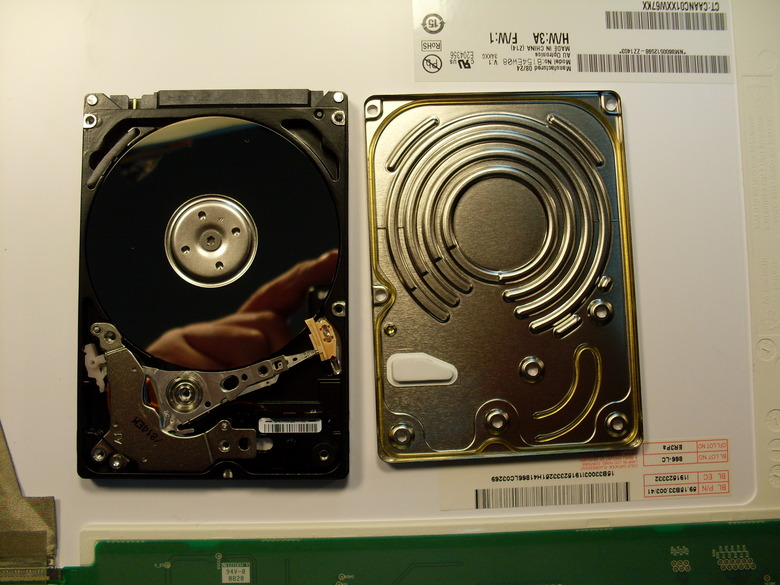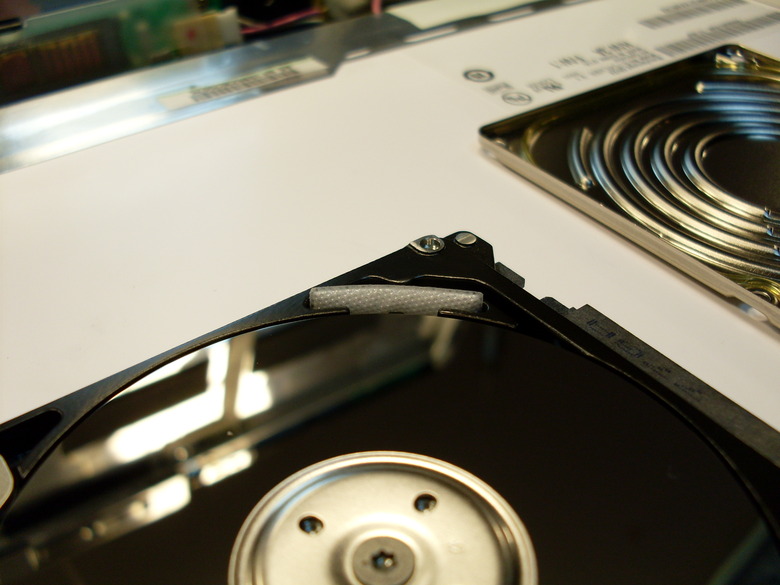Answer the question
In order to leave comments, you need to log in
Railway with helium
WD again somewhere told something about the advantages of having helium in the HDA. The main theses - the density is several times less than the density of air; friction against the gas environment will significantly decrease, Western Digital says a 23% reduction in consumption or an improvement of 45% in such a parameter as energy consumption per terabyte.
It is possible to purge the HDA with helium (for balloons or tires) and seal the barometric valve, assuming that the HDD will not fly into the stratosphere. This can give a profit in the form of reduced heating of the plates (read less thermal calibrations, wear of the ferrole due to temperature changes and contamination of magnetic heads? Or, due to a decrease in the density of the gaseous medium, the heads will not be able to stay in flight above the surface of the disks? Or vice versa, flight altitude will decrease from 3-5 microns to 1-2, which will improve the reading?
In principle, railways now cost a penny. Is it worth doing such an inhuman experience or is it doomed for some reason?
Answer the question
In order to leave comments, you need to log in
Hard will first give out data in a funny, stupid voice, and then, when all the gas is out, it will die, for the reasons described by VoidVolker
Blowing the disk with ordinary helium from an ordinary cylinder will most likely either kill it immediately or when turned on, or greatly reduce the life of the disk - because a wild amount of dust from the cylinder, hose, valves, even from ordinary rubber gaskets will immediately fly into the hard drive. For such an operation, it is best to use a clean room, special high purity helium and appropriate clean instruments. So I think it's cheaper to just backup regularly than to pump hard helium.
Once I was “lucky” to take part in the fight against dust and dirt in one optical device, which is located in a special high-vacuum chamber, which itself is located in a clean room - there was a lot of dust / dirt. So there is a lot of different dust everywhere and it can arise from unexpected places.
In any case, the experience is interesting. Especially with an autopsy and a report on Habré.
Changing the properties of the gas should not affect the flight of the magnetic head - hard drives are capable of operating at altitudes up to 3 km, and there the pressure is 0.7 atm. But here is another problem, the size of helium molecules is smaller than the molecules of nitrogen and oxygen.
It will not stay in the disk for a long time and will flow out through the rubber seals.
Not without reason, helium balloons have a metallized shell.
You will need to improve the tightness of the jar.
If you pump helium at home, the main problem will be dust that can settle on the surface of the magnetic disk. The size of the magnetic domains of modern disks is very, very small, and helium used for domestic use will contain dust and impurities. This microscopic dust may well cause read errors that will render the disc unusable for its intended purpose.
And yes, helium should not interfere with the operation of the hard drive.
Since such a booze has gone on ... the first victim ...


The white casing of the barometric valve is visible on the lid, from the outside it is the same hole in the lid.
And next to the discs is visible air filter. It stands in the air outlet channel of centrifugal air masses. The channel is narrow and widens in front of the filter. The flow rate drops and the debris gently settles on the filter. I believe that he should catch everything harmful to the mechanics, and smaller particles will not bring harm. After pumping helium, you can make several power-ups of the hard drive, but turn it off before reaching the standard speed and unparking the heads. The volume of gas there is small, everything should be filtered quickly.
The main purpose of the HDA is to prevent microscopic dust, and not to contain gas.
In the case of air on both sides of the HDA, the same gas with the same characteristics does not require absolute tightness. If the air mixes, it will not affect the work in any way, gas molecules are smaller than dust.
In a conventional hard drive, the materials for helium are not exactly the same. The helium concentration will fall, it will come out through the seams (after all, the disk is assembled from two halves), it will certainly take time, but in the end it will be replaced by ordinary air.
Didn't find what you were looking for?
Ask your questionAsk a Question
731 491 924 answers to any question